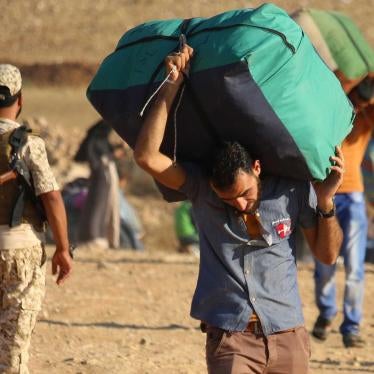(Beirut) –Kuwaiti security forces arrested at least 16 stateless residents of Kuwait, known as Bidun, during a peaceful demonstration on May 1, 2012, in support of their rights to nationality, Human Rights Watch said today. Kuwaiti authorities should respect the rights of Bidun to peaceful assembly, Human Rights Watch said.
Masked officers used batons and armoured vehicles to disperse and arrest the protesters, participants and Kuwaiti activists told Human Rights Watch.On May 2 the Interior issued a statement confirming the arrests of 14 people. The ministry alleged that demonstrators ignored its “repeated warnings” that demonstrations by “illegal residents” are not allowed and that the protesters had committed “shameful acts that are punishable by law,” such as trying to “burn tires and block roads.” Local rights activists challenged the statement and told Human Rights Watch that the gathering was peaceful.
“The Bidun have a right like anyone else to peaceful protest, which the Kuwaiti authorities are obligated to respect,” said Sarah Leah Whitson, Middle East director at Human Rights Watch. “The government needs to realize that suppressing peaceful demonstrations isn’t going to make Bidun grievances go away.”
On May 3 the authorities transferred 16 detained Bidun protesters to the Public Prosecutor’s Office for investigation and possible prosecution, Mohamed al-Humaidi, director of the Kuwait Society for Human Rights, told Human Rights Watch.
On May 1 between 200 and 300 Bidun gathered near al-Sha’bi mosque in Taima’a to demand government action on their citizenship claims and resolution of their stateless status. Witnesses and family members told Human Rights Watch that Abdul Hakeem al-Fadhli, a prominent Bidun activist, was among those arrested. They said plainclothes security forces took him into custody after he emerged from al-Sha’bi mosque before the demonstration started.
The Kuwait government has designated the more than 106,000 stateless Bidun illegal residents and denied them citizenship for decades, even though many were born in Kuwait or are longtime residents. The Bidun have organized numerous demonstrations since February 2011 calling on authorities to address their citizenship claims.
The government has repeatedly promised to address citizenship claims of stateless residents, but has taken little action to resolve the issues of Bidun. In 2010 the government announced that it had set up a new committee to address the citizenship claims and promised to resolve them within five years. In November 2012 authorities admitted that 34,000 Bidun claimants are eligible for citizenship, but authorities have not made public the number of citizenships they have granted to Bidun since 2010.
Human Rights Watch has repeatedly called on the government to expedite its review of Bidun claims and to take into account longstanding Bidun ties to Kuwait when reviewing the claims. Many Bidun have no access to identification documents, such as birth certificates or passports, and are barred from legal employment as “illegal residents.”
Three participants in the demonstration told Human Rights Watch that within minutes after the protesters had gathered near the mosque, security forces warned that “non-Kuwaitis have no right to demonstrate” and that they should end the protest.
The Kuwait Society for Human Rights issued a statement saying that three of its staff had observed the gathering and that security forces briefly detained Fayez al-Sultani, vice chairman of the organization.
“It raises concern that the forces of the Ministry of Interior used excessive force in dealing with peaceful demonstrators,” the group said.
According to local activists and lawyers, nearly 180 Bidun and Kuwaitis are currently on trial on charges such as “participating in an illegal gathering,” “resisting, insulting, and threatening police officers,” and “destroying police property,” stemming from their participation in demonstrations in 2011 and 2012.
The Kuwaiti government has issued repeated warnings that Bidun should not gather in public, despite the country's obligation under international law to protect the right to peaceful assembly. Article 12 of the 1979 Public Gathering law bars non-Kuwaitis from participating in public gatherings. However Kuwait’s constitution guarantees “all individuals” the right to peaceful assembly.
Kuwait ratified the International Covenant on Civil and Political Rights (ICCPR) in 1996. Article 21 of the ICCPR states that "the right of peaceful assembly shall be recognized," and that "no restrictions may be placed on the exercise of this right other than those imposed in conformity with the law and which are necessary in a democratic society in the interests of national security or public safety, public order, the protection of public health or morals or the protection of the rights and freedoms of others."








